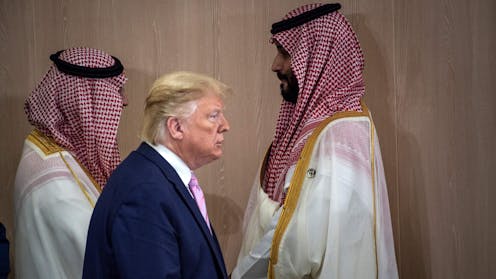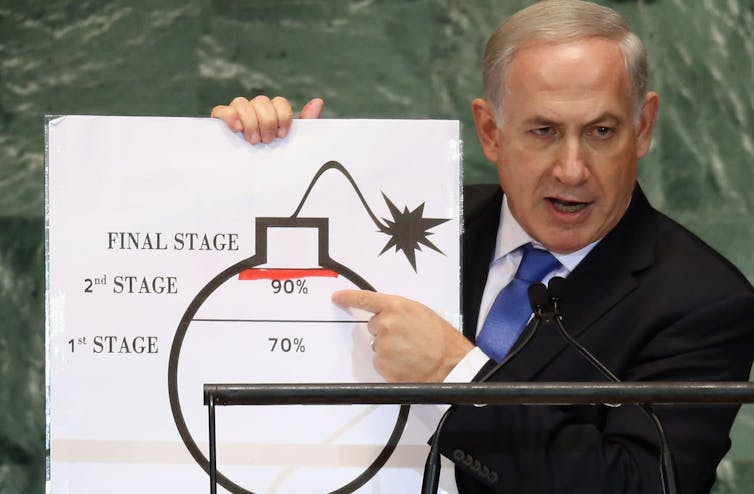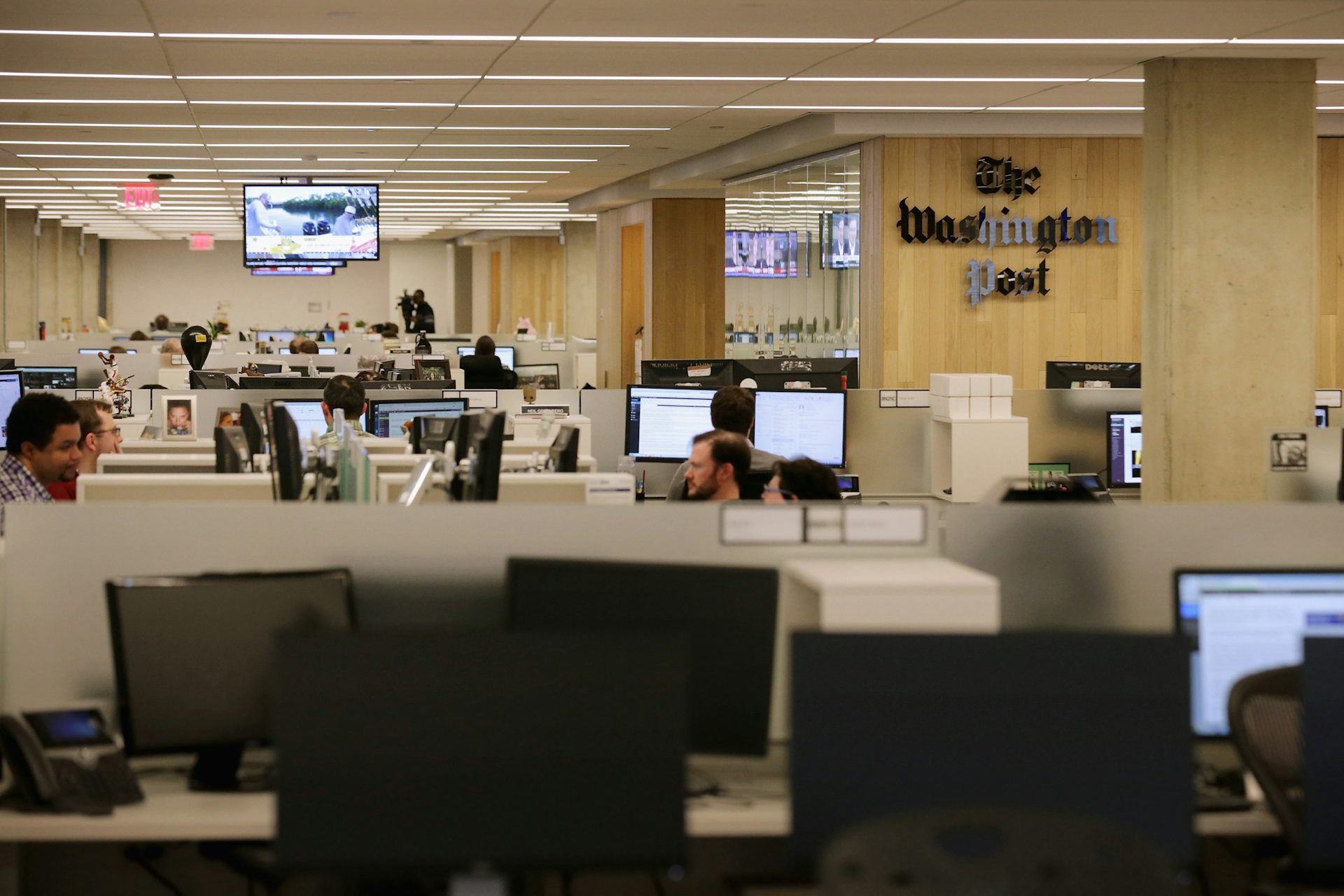Trump heads to the Gulf aiming to bolster trade ties – but side talks on Tehran, Gaza could drive a
Trump’s first policy-driven overseas visit in his second term will be the Persian Gulf. Trade, Tehran talks and possibly Gaza will be on the agenda.

President Donald Trump will sit down with the Saudi crown prince and Emirati and Qatari leaders on May 14, 2025, in what is being heavily touted as a high-stakes summit. Not invited, and watching warily, will be Israeli Prime Minister Benjamin Netanyahu.
Like many other members of his right-wing coalition, Netanyahu appeared delighted at the election of Trump as U.S. president in November, believing that the Republican’s Middle East policies would undoubtedly favor Israeli interests and be coordinated closely with Netanyahu himself.
But it hasn’t quite played out that way. Of course, Washington remains – certainly in official communications – Israel’s strongest global ally and chief supplier of arms. But Trump is promoting a Middle East policy that is, at times, distinctly at odds with the interests of Netanyahu and his government.
In fact, in pushing for an Iran nuclear deal – a surprise reversal from Trump’s first administration – Trump is undermining long-held Netanyahu positions. Such is the level of alarm in Israeli right-wing circles that rumors have been circulating of Trump announcing unilateral U.S. support for a Palestinian state ahead of the Riyadh visit – something that would represent a clear departure for Washington.
As a historian of Israel and the broader Middle East, I recognize that in key ways Trump’s agenda in Riyadh represents a continuation of the U.S. policies, notably in pursuing security relationships with Arab Gulf monarchies – something Israel has long accepted if not openly supported. But in the process, the trip could also put significant daylight between Trump and Netanyahu.
Trump’s official agenda
The four-day trip to the Gulf, Trump’s first policy-driven foreign visit since being elected president, is on the surface more about developing economic and security ties between the U.S. and traditional allies in the Persian Gulf.
Trump is expected to cement trade deals worth tens of billions of dollars between the U.S. and Arab Gulf States, including unprecedented arms purchases, Gulf investments in the U.S. and even the floated Qatari gift of a palatial 747 intended for use as Air Force One.
There is also the possibility of a security alliance between the U.S. and Saudi Arabia.
So far, so good for Israel’s government. Prior to the Oct. 7 attacks, Israel was already in the process of forging closer ties to the Gulf states, with deals and diplomatic relations established with the United Arab Emirates and Bahrain through the Abraham Accords that the Trump administration itself facilitated in September 2020. A potential normalization of ties with Saudi Arabia was also in the offing.
Dealing with Tehran
But central to the agenda this week in Riyadh will be issues where Trump and Netanyahu are increasingly not on the same page. And that starts with Iran.
While the country won’t be represented, Iran will feature heavily at Trump’s summit, as it coincides with the U.S. administration’s ongoing diplomatic talks with Tehran over its nuclear program. Those negotiations have now concluded four rounds. And despite clear challenges, American and Iranian delegations continue to project optimism about the possibility of reaching a deal.
The approach marks a change of course for Trump, who in 2018 abandoned a similar deal to the one he is now largely looking to forge. It also suggests the U.S. is currently opposed to the idea of direct armed confrontation with Iran, against Netanayhu’s clear preference.
Diplomacy with Tehran is also favored by Gulf states as a way of containing Iran’s nuclear ambitions. Even Saudi Arabia – Tehran’s long-term regional rival that, like Israel, opposed the Obama-era Iran nuclear diplomacy – is increasingly looking for a more cautious engagement with Iran. In April, the Saudi defense minister visited Tehran ahead of the recent U.S.-Iranian negotiations.
Netanyahu has built his political career on the looming threat from a nuclearized Iran and the necessity to nip this threat in the bud. He unsuccessfully tried to undermine President Barack Obama’s initial efforts to reach an agreement with Iran – resulting in 2015’s Iran nuclear deal. But Netanyahu had more luck with Obama’s successor, helping convince Trump to withdraw from the agreement in 2018.
So Trump’s about-turn on Iran talks has irked Netanyahu – not only because it happened, but because it happened so publicly. In April, the U.S. president called Netanyahu to the White House and openly embarrassed him by stating that Washington is pursuing diplomatic negotiations with Tehran.
Split over Yemen
A clear indication of the potential tension between the Trump administration and the Israeli government can be seen in the ongoing skirmishes involving the U.S., Israel and the Houthis in Yemen.
After the Houthis fired a missile at the Tel Aviv airport on May 4 – leading to its closure and the cancellation of multiple international flights – Israel struck back, devastating an airport and other facilities in Yemen’s capital.
But just a few hours after the Israeli attack, Trump announced that the U.S. would not strike the Houthis anymore, as they had “surrendered” to his demands and agreed not to block passage of U.S. ships in the Red Sea.
It became clear that Israel was not involved in this new understanding between the U.S. and the Houthis. Trump’s statement was also notable in its timing, and could be taken as an effort to calm the region in preparation of his trip to Saudi Arabia. The fact that it might help smooth talks with Iran too – Tehran being the Houthis’ main sponsor – was likely a factor as well.
Timing is also relevant in Israel’s latest attack on Yemeni ports. They took place on May 11 – the eve of Trump setting off for his visit to Saudi Arabia. In so doing, Netanyahu may be sending a signal not only to the Houthis but also to the U.S. and Iran. Continuing to attack the Houthis might make nuclear talks more difficult.
Bibi’s political survival-first approach
Critical observers of Netanyahu have long argued that he prioritizes continued war in Gaza over regional calm for the sake of holding together his far-right coalition, members of which desire full control of the Gaza Strip and de-facto annexation of the West Bank.

This, many political commentators have argued, is the main reason why Netanyahu backed off from the last stage of the ceasefire agreement with Hamas in March – something which would have required the withdrawal of the Israeli army from the Gaza Strip.
Since the collapse of the ceasefire, Israel’s army has mobilized in preparation for a renewed Gaza assault, scheduled to start after the end of Trump’s trip to the Gulf.
With members of the Netanayhu government openly supporting the permanent occupation of the strip and declaring that bringing back the remaining Israeli hostages is no longer a top priority, it seems clear to me that deescalation is not on Netanyahu’s agenda.
Trump himself has noted recently both the alarming state of the hostages and the grave humanitarian crisis in Gaza. Now, in addition to the release of Israeli-American hostage Edan Alexander, the U.S. is also engaged in negotiations with Hamas over ceasefire and aid – ignoring Netanyahu in the process.
The bottom dollar
Current U.S. policy in the region may all be serving a greater aim for Trump: to secure billions of dollars of Gulf money for the American economy and, some have said, himself. But to achieve that requires a stable Middle East, and continued war in Gaza and Iran inching closer to nuclear capabilities might disrupt that goal.
Of course, a diplomatic agreement over Tehran’s nuclear plans is still some way off. And Trump’s foreign policy is notably prone to abrupt turns. But whether guided by a dealmaker’s instincts to pursue trade and economic deals with wealthy Gulf states, or by a genuine – and related – desire to stabilize the region, his administration is increasingly pursuing policies that go against the interests of the current Israeli government.
Asher Kaufman does not work for, consult, own shares in or receive funding from any company or organization that would benefit from this article, and has disclosed no relevant affiliations beyond their academic appointment.
Read These Next
Historically Black colleges and universities do more than offer Black youths a pathway to opportunit
HBCUs make up just 3% of the country’s colleges and universities. But their graduates include 40%…
Local governments provide proof that polarization is not inevitable
Partisan debates are less heated at the local level, providing lessons that might help calm the waters…
‘Which Side Are You On?’: American protest songs have emboldened social movements for generations, f
Bruce Springsteen wrote and recorded ‘Streets of Minneapolis’ within days of Alex Pretti’s killing,…





